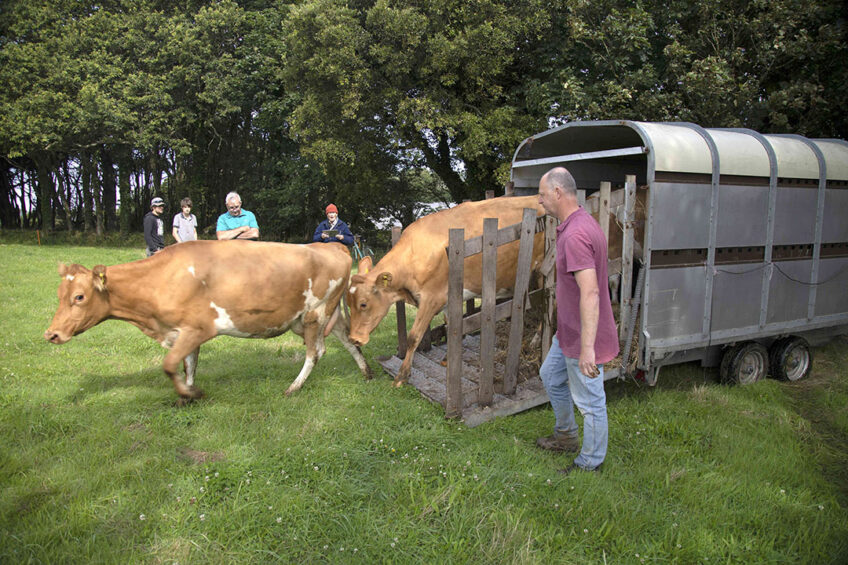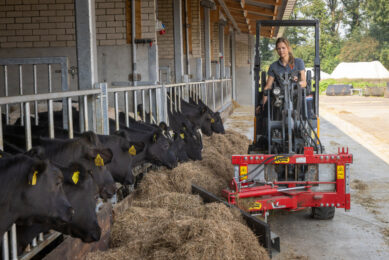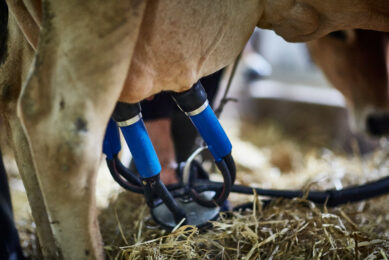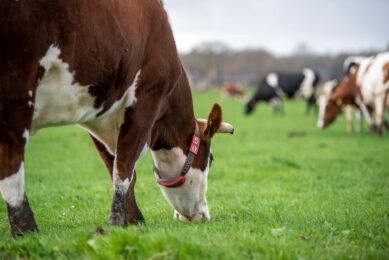History is made as new milking herd arrives on Sark island

Fresh milk is once again being produced on the tiny island of Sark, just north of France in the Channel Islands, as the first cows of a new dairy herd have arrived heralding a new era for the 500 residents there.
A new barn kitted out with a milking parlour and milk pasteuriser had already been erected in time for the cows’ arrival from the neighbouring Guernsey Island. There are currently 9 cows milking on the farm.

Just 2 years ago the island initiated a global hunt for a new dairy farmer to set up on Sark as the previous one had retired in 2017 forcing residents to import their dairy produce from outside the island. In the end, Jason Salisbury and his wife, Katharine, who also run a herd of pedigree Guernsey cows on Whitegate Farm near Suffolk, were picked for the Sark challenge.
Profile
Name: Jason Salisbury and his wife Katharine run the dairy farm on Sark island
Milking: There are currently nine cows milking on the farm at the moment producing 120 litres per day but the goal is to have 22-25 cows in the future. They have installed a new DeLaval four-point milking parlour.
Location: Sark Island is one of the Channel Islands measuring only 5.6 km (3.5 miles) long and 2.4 km (1.5 miles) wide.
The couple and their 2 children have a wealth of experience producing dairy products as they already make their own award-winning Suffolk cheeses from their own top-quality Guernsey cow milk. Jason was in high spirits about the arrival of the cows and the new barn and was very happy to be producing milk on the island.

Shipment of cows
“These are exciting times for sure,” Jason says. “The dairy, which is designed to hold 20 to 25 cows, has been completed and the first shipment of cows are already here producing milk. We sourced a herd of 14 Guernsey cows and a number of youngstock from a lady on Guernsey Island who has recently retired from milking.
The cows and heifers are shipped over a few at a time, weather permitting. “We simply load them into a modified cattle trailer in Guernsey which is then driven to the dock and loaded onto the boat by crane. The same process, only in reverse, is repeated on Sark and the cows will be unloaded in our fields.”

Sark Island relies on tourism and agriculture to support its economy. It has no cars, no paved roads, no street lighting and almost no pollution, but does attract over 50,000 visitors each year fed by a number of eateries that need milk.
The milk is pasteurised first and is then sold via a vending machine at the dairy for £2 per litre. Island residents and tourists can also add flavours to make milkshakes which are already proving to be very popular.
DeLaval milking parlour
“We have installed a new DeLaval 4-point milking parlour, which is actually half a parlour as it is only one side. The bulk tank is installed, the pasteuriser is working away, as is the vending machine,” says Jason.
“We have obtained all the correct hygiene certificates and I’ve currently got milk going through a vending machine here on the farm. The idea is that people will come to the dairy and buy their milk from the machine using their own bottle or our own labelled bottles I will supply when they arrive.”

The Salisburys were selected by a Sark Island committee out of around 80 applications from across the world to take over milk production on Sark. Jason and Katharine know the Guernsey breed very well as they have been using the breed on their own farm for over 35 years.
“The cows will be grazed outdoors for as long as possible and we already have a good stock of winter forage produced on other farms already here,” says Jason. “In the parlour the cows will receive a scoop of concentrates manually as they come in to be milked.”
Challenges on the island
“Being on an island there are a number of challenges to face. My parlour is basically a vacuum pump and a pulsator. The reason being is that I can’t just nip down to the local dealer for parts as everything needs to be ordered and shipped to the island. With this is mind all the equipment has been kept simple and I carry 25% of parts already in my store.”

“Other challenges include the price of electricity which on the island is currently 58 pence per kW, which is very high. We have solar panels on the dairy roof to help run the pasteuriser and reduce costs. I intend batch pasteurising every 3 days,” said Jason.
“Importing concentrates for the herd is another huge cost, probably around £600 per tonne for an 18% ration. My aim is to eventually feed the cows a simple rolled barley diet in the parlour, which is produced on Sark already.”
With demand for dairy produce from 500 residents and some 50,000 tourists Jason has to calculate his supply accurately to ensure a good balance. “Throughout the year I’m looking at keeping an average of 10 cows in milk averaging 10 to 15 litres of milk per day, which is 150 litres per day. I need around 300 to 450 litres to make efficient use of the pasteuriser each time I use it. There is also a chocolatier on the island who is eagerly awaiting some cream for her business as well.”

Jason is AI trained and will use only Guernsey bulls bred on Guernsey on his new herd. He has his own AI flask which is already stocked and can be sent over to Guernsey on the cargo ship when it needs refilling. Jason and Katharine’s 2 children, who are university age, will travel to the island to lend a hand on the farm when they can.
Covid and logistics have been the main challenges getting this project going for Jason, but he has absolutely no regrets taking on the farm. His own farm in Suffolk is being managed by his staff while he is on Sark.
Join 13,000+ subscribers
Subscribe to our newsletter to stay updated about all the need-to-know content in the dairy sector, two times a week.










